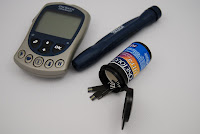Obsessive Compulsive Eating vs. Eating Responsibly
It probably comes as no surprise that I don't get along to well with many other health and nutrition experts.
For the most part, I blame a lot of them for today's rampant outbreak of obsessive compulsive eating (OCE).
In my opinion people are worrying way too much about how to eat, when to eat, what to eat and why they should eat.
Eating is supposed to be healthy. And, it is supposed to be just as psychologically healthy as it is physically healthy.
Getting super stressed over the fact that you want to eat 9 times today, cycling your carbohydrates, making sure to only eat fat with your protein, to make sure there's no carrots in you salad, and that your post workout shake contained exactly 45.445476% protein makes no sense to me at all. I'd go so far as to say that the psychological damage that extreme OCE can do to you mentally far out weighs the damage an extra diner roll with supper can do to you physically.
While many health and nutrition professionals like to complicate matters as much as possible, every once in a while I get an email that makes a lot of sense, because its simple, logical and effective.
The most recent one came from Craig Ballantyne.
One of the most common questions I get regarding Eat Stop Eat is people asking how to eat during the days they aren't fasting. My answer is always to try and eat responsibly. If you want a good definition of what 'eating responsibly' should look like, see Craig's 5 steps in his email below.
Even step 5, (which may sound a little OCE) is definitely not an example of OCE. Sure, if you think of it like a bodybuilder freezing 49 individually weighed meals in his freezer then its probably OCE. But, if you think about someone who shops for their family, this is a very important piece of the healthy eating puzzle.
Simply put, if you run out of healthy foods on Thursday, and you have a family to feed, Thursday night will quickly become 'pizza night'. Have this happen 5 or 6 weeks in a row, and you are looking at recipe of an entire family overeating and putting on the pounds. Being prepared is different than being obsessed.
Here's a copy of Craig's e-mail in case you missed it...
I truly believe that nutrition is the biggest, by far, component of a good fat loss program.
There's a saying in the fitness industry, "you can't out-train a bad diet", and that hold's true almost 100% of the time (and especially as you get older).
Fortunately, I also believe that good nutrition for fat loss is very simple. And here are my 5 steps to building a fast fat burning diet.
1) Find out how much you are eating now. Use fitday.com.
2) If you are not losing weight, eat less.
3) Eat fruits, vegetables, nuts, and good protein sources. Don't eat junk from a bag or a box.
4) Give yourself one treat meal per week to look forward to - not a treat day, just a treat meal.
5) Plan ahead. Prepare your meals (spend 1-2 hours on the weekend getting your meals and meal plan ready for the week). Identify
obstacles and come up with solutions to avoid them.
That is it.
Very simple. Most people do pretty well on 1-3 and even 5, but mess up on number 4. I often hear how well someone did all day long, but then while making dinner they snack on upwards of 500 calories of their kid's treats, or other processed carbohydrates they have lying around the house.
The little things can add up to big time problems. So take a good long look at everything you eat.
And all of this can be avoided if you follow rule #5.
Combine my five simple nutrition rules with three short workouts per week of resistance training and interval training, and you have a very manageable fat loss plan that can fit any busy lifestyle.
Get started with the fast Turbulence Training fat burning workouts:
==> http://www.turbulencetraining.com
There are NO negative calorie foods,
Craig Ballantyne, CSCS, MS
Author, Turbulence Training
Couldn't have said it better myself,
BP






























